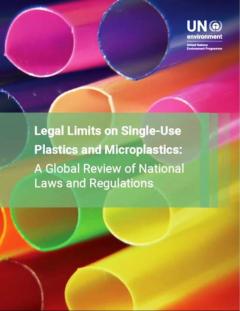
This report provides a global overview on the progress of countries in passing laws and regulations that limit the manufacture, import, sale, use and disposal of selected single-use plastics and microplastics which have a great impact in the production of marine litter. AEJI has conducted theresearch in Israel. Omer Machluf, intern at law office, studied Law and political sciences for Master degree at Bar Ilan University, did the research in frame of AEJI. Carmit Lubanov, AEJI's Director coordinating the research in Israel.
Key Findings - Global Perspective:
As of July 2018, one hundred and twenty-seven (127) out of 1921 countries reviewed (about 66%) have adopted some form of legislation to regulate plastic bags. The first regulatory measures specifically targeting plastic bags were enacted in the early 2000s, gradually increasing throughout the decade, with many countries enacting restrictions in the past few years. Plastic bags regulations include restrictions on the manufacture, distribution, use, and trade of plastic bags, taxation and levies, and post-use disposal. The regulations vary considerably in their comprehensiveness, but the most common form is the restriction on free retail distribution.
Twenty-seven (27) countries have enacted legislation banning either specific products (e.g. plates, cups, straws, packaging), materials (e.g. polystyrene) or production levels. Twenty-seven (27) countries have instituted taxes on the manufacture and production of plastic bags while thirty (30) charge consumers fees for plastic bags at the national level. Forty-three (43) countries have included elements or characteristics of extended producer responsibility for plastic bags within legislation. Sixty-three (63) countries have mandates for extended producer responsibility for single-use plastics, including deposit-refunds, product take-back, and recycling targets.
As of July 2018, eight out of 192 countries worldwide (4%) have established bans of microbeads through national laws or regulations. These countries are Canada, France, Italy, Republic of Korea, New Zealand, Sweden, the United Kingdom of Great Britain and Northern Ireland, and the United States of America.
An additional four countries - Belgium, Brazil, India, and Ireland - have proposed new laws or regulations banning microbeads at the national level.
The European Union has also started a process to restrict the intentional addition of microplastics to consumer and professional use products. Seven out of eight of the countries with laws or regulations controlling the use and/or manufacture of microbeads include only a subset of personal care products documented to contain microbeads.
New Zealand’s microbead law however not only includes personal care wash-off products, it also regulates abrasive household, car and industrial cleaning products.
The information presented in this report documents that countries are using a wide range of methods to regulate single-use plastic bags, plastic single use items, and microplastics containing products at the national level.
These approaches vary by region, countries, and type of plastic product, and include bans, market and trade-based mechanisms, and voluntary measures.
As awareness and concern over marine plastic litter and microplastics continues, controlling the manufacture, use, and disposal of plastic products will help in particular contribute to Sustainable Development Goal 14.1 Learning from the experiences of countries that have taken important steps, like bans, restrictions, taxes and levies, will help further momentum to reduce marine litter and protect the world’s precious water resources.

